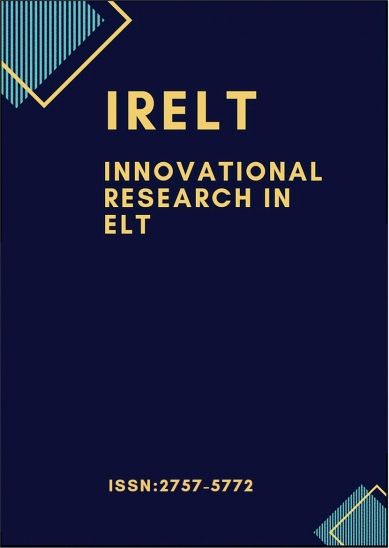Research article | Open Access
Innovational Research in ELT 2020, Vol. 1(1) 34-44
A comparative study on the perceptions of EFL teachers on the use of mother tongue
pp. 34 - 44 | DOI: https://doi.org/10.29329/irelt.2020.311.4
Publish Date: December 17, 2020 | Single/Total View: 477/1.203 | Single/Total Download: 710/2.601
Abstract
The use of mother tongue in the L2 classroom is a controversial issue in the field of ELT. Therefore, the present study investigated the perceptions of four ELT teachers working at different private institutions on the use of mother tongue in the L2 classroom. The semi-structured interviews were conducted to gather the data. The gathered data, which were coded and labelled, were used to explore the perceptions of the teachers and the effect of school policy on the teachers and students' feeling. The findings of the study revealed that EFL teachers have positive perceptions of using mother tongue if it is used in a limited and purposeful way. In addition, the results indicated that the English only policy has a negative impact on teachers. Yet, even if it is allowed to use L1 in the L2 classroom, EFL teachers suffer remorse. As for students, they feel comfortable and safe according to the teachers' observation.
Keywords: L1, L2, perceptions, mother tongue, language teaching, EFL teachers, L2 classroom, code switching
APA 7th edition
Acar, S.C. (2020). A comparative study on the perceptions of EFL teachers on the use of mother tongue. Innovational Research in ELT, 1(1), 34-44. https://doi.org/10.29329/irelt.2020.311.4
Harvard
Acar, S. (2020). A comparative study on the perceptions of EFL teachers on the use of mother tongue. Innovational Research in ELT, 1(1), pp. 34-44.
Chicago 16th edition
Acar, Sibel Can (2020). "A comparative study on the perceptions of EFL teachers on the use of mother tongue". Innovational Research in ELT 1 (1):34-44. https://doi.org/10.29329/irelt.2020.311.4
Akulova, B. (2019). Teachers’ and Students’ attitude towards L1 use in English Classroom in contexts of Turkey and Kyrgyzstan. Sakarya University, Turkey.
Auerbach, E. R. (1993). Re-examining English Only in the ESL Classroom. TESOL Quarterly, 27(1), 9-32.
Büyükyazı, M. &Solhi, M. (2011). The Use of First Language in the EFL Classroom: A Facilitating or Debilitating Device? Paper presented at 1st International Conference on Foreign Language Teaching and Applied Linguistics, Sarajevo. Retrieved from: https://www.researchgate.net/publication/303610200
Caine T. M. (2008). Do You Speak Global? The Spread of English and the Implications for English Language Teaching. Canadian Journal for New Scholars in Education, 1(1).
Copland, F. &Neokleous, G. (1993). L1 to teach L2: complexities and contradictions. ELT Journal. Retrieved from eltj.oxfordjournals.org
Croker, R &Heigham, J. (2009). Interviews. In Qualitative Research in Applied Linguistics: A Practical Introduction, pp. 182-192. New York & London: Palgrave Macmillan.
Debreli, E. (2016). Perceptions of Non-Native EFL Teachers on L1 use in L2 Classrooms: Implications for Language Program Development. English Language Teaching, 9(3), 24-32.
Inal, S., &Turhanlı, I. (2019). Teachers’ opinions on the use of L1 in EFL classes. Journal of Language and Linguistic Studies,15(3), 861-875.
Kaymakamoğlu, S. &Yıltanlılar, A. (2019). Non-native English teachers’ perceptions about using Turkish (L1) in EFL classrooms: A case study. International Online Journal of Education and Teaching (IOJET),6(2), 327-337
Kuru, E.M. &Tekin, M. (2019). A Comparative Study on the Perspectives of EFL Teacher Candidates and Vocational High School Students on L1 Use in English Classrooms. International Association of Research in Foreign Language and Applied Linguistics,8(1),42-63.
Ma, L.P.F (2016). Examining the Functions of L1 use through Teacher and Student Interactions in an Adult Migrant English Classroom. International Journal of Bilingual Education and Bilingualism,22(4), 386-401.
McMillan, B.A. & Rivers, D. J. (2011). The Practice of Policy: Teacher attitudes toward “English only”. System,39, 251-263.
Sali, P. (2014). An Analysis of the Teachers’ use of L1 in Turkish EFL Classrooms. System,42, 308-318.
Shin, J.Y., Dixon, L.Q. & Choi, Y. (2019). An Updated Review on Use of L1 in Foreign Language Classrooms. Journal of Multilingual and Multicultural Development. Retrieved from: https://doi.org/10.1080/01434632.2019.1684928
Taşkın, A. (2011). Perceptions on Using L1 in Language Classrooms: A Case Study in a Turkish Private University. Middle East Technical University, Turkey.
Timor, T. (2012). Use of the Mother Tongue in Teaching a Foreign Language. Language Education in Asia,3(1).
Tunçay, B. (2014). Teachers’ Attitudes towards and Practices of L1 Use in EFL Classroom. Bilkent University, Turkey.
Turkish Ministry of Education (2018). İngilizceDersiÖğretimProgramı. Retrieved on May 2, 2020 from: http://mufredat.meb.gov.tr/Dosyalar/201812411191321%C4%B0NG%C4%B0L%C4%B0ZCE%20%C3%96%C4%9ERET%C4%B0M%20PROGRAMI%20Klas%C3%B6r%C3%BC.pdf
Walch, A. & Monroy, F. (2019). Beliefs about L1 Use in teaching English: A Comparative Study of Polish and Spanish Teacher- Trainers. Language Teaching Research, 1-19.
